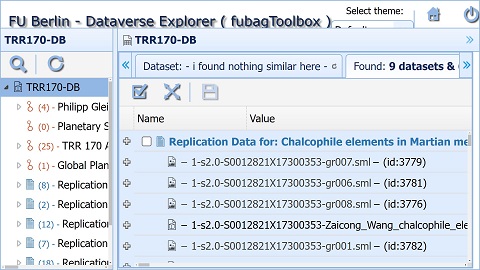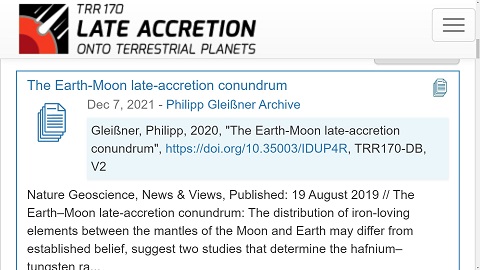Globally Findable Planetary Data: The Interdisciplinary TRR170-DB Repository
- 1Museum für Naturkunde, Leibniz-Institut für Evolutions- und Biodiversitätsforschung, Berlin, Germany
- 2Freie Universität Berlin, Institute of Geological Sciences - TRR 170, Berlin, Germany
- 3Freie Universität Berlin, Central Library, Berlin, Germany
Introduction: The TRR170-DB data repository (https://planetary-data-portal.org/) manages the research data from the collaborative research center ‘Late Accretion onto Terrestrial Planets’ (TRR 170). The published data are provided in open machine-readable formats to the planetary science community. They have been generated in various fields of planetology such as astromaterials science, experimental studies, remote sensing, and geophysical modeling. Our data policy and practices are aligned with the principles of Open Science [1] and the FAIR principles [2] fostering openness and transparency in scientific research. Since TRR170-DB is permanently hosted at Freie Universität Berlin (FUB) and interlinked with FUB’s Central Library System the data are on a long term scale preserved and accessible. The TRR170-DB is referenced by Re3data, a global registry of research data repositories [3].
The TRR170-DB system: The repository is operated on the open source data management software Dataverse [4]. Users access the repository directly through its interface that connects to the storage environment of the datasets. Alternatively, a web portal allows for repository access while also guiding users how to use TRR170-DB.
Data access, storage, and publication: While the TRR170-DB serves as a hub to exchange data for the TRR 170 user community through a password-guarded member area, published data are also accessible for other interested researchers. The repository interface provides search tools to allow users to conduct general searches or specify queries for published data via filters. Filters can direct searches to specific published data types (i.e., planetary materials/geophysics, planetary surface data, astronomy) via their metadata information. Specified searches result in compilations of data and metadata information available in the repository that can be directly viewed, saved, and downloaded via the advanced search tool Data Explorer (Fig.1). The Data Explorer complements the TRR170-DB and is an integrated part of the repository.

Fig. 1: TRR170-DB Data Explorer query results.
We support TRR 170 members and other users to meet journals’ and funding agencies’ requirements for FAIR data by providing storage for replication datasets (Fig. 2). Replication datasets make published data more easily findable and usable for other researchers. At present, most replication datasets were provided and used by TRR 170 authors of articles appearing in international journals since 2016. These replication datasets are freely available, and no special permission is required for reuse and verification of a study without having to contact the study's authors.

Fig 2: Replication datasets in TRR170-DB linked to published research articles.
Any data supplier receives a permanent archive and a digital object identifier (DOI, [5]) to make the dataset unique and findable. Data suppliers are requested to apply standardized ways to annotate, structure and organize data. This metadata information on the content, quality, origin, and other characteristics of the datasets ensure reliable data quality for future use in other research projects. In this way, data from different projects can be easier exchanged and be understood when used in different contexts. Metadata information links a dataset to its related published peer-reviewed paper.
The metadata model: TRR170-DB has a flexible data-driven metadata system that uses tailored “metadata blocks” for specific data communities. The metadata blocks are based on standards that are compliant with several international metadata schemata (i.e. DDI, DataCite, Dublin Core, VOResource Schema, etc.) and controlled vocabularies. Once a dataset has been published, its metadata and files can be exported in various other open metadata standards and file formats (Fig. 3) to allow for easy data transfer among various international external databases and repositories.
Fig. 3: Extract of TRR170-DB metadata and controlled vocabulary to metadata formats, upper right corner.
TRR170-DB integration into the FUB Central Library System: FUB Central Library System houses the institutional open access repository, Refubium that contains research data collections. When TRR 170 members contribute datasets to the TRR 170-DB repository, the published version of this datasets gets automatically mirrored by the Refubium. This ensures a global visibility and accessibility through FUB's institutional repository.
Within the TRR 170-DB repository, rigorous curation standards have been upheld to maintain the quality and integrity of the research data to ensure their reliability and suitability for scholarly use. To enhance data discovery and citability, published datasets are assigned an additional DOI through the FUB Refubium. The FUB Refubium is using the OAI-PMH (Open Archives Initiative Protocol for Metadata Harvesting) protocol [6] to harvest metadata in the TRR170-DB repository. The integration of the TRR170-DB repository with FUB's Central Library System extends its accessibility to users worldwide. Through Primo, FUB's discovery and access platform interested users gain seamless access to the diverse range of datasets available within Refubium.
Future Work: When the TRR 170 research program closes at the end of 2024, all data stored in the TRR170-DB repository will be further accessible to the interested user through three different avenues: via (1) the TRR170-DB repository, (2) the FUB Refubium, and (3) the TRR 170 webpage. As a result, the TRR 170-DB repository facilitates the dissemination and discovery of valuable research data, fostering a culture of knowledge sharing and academic excellence.
Acknowledgements: The TRR170-DB repository is managed by subproject TRR 170-INF (German Research Foundation (DFG), 263649064–TRR 170). Freie Universität Berlin provides server infrastructure and a web content management system for managing the TRR170-DB website. Dataverse software is maintained by the IQSS Dataverse team, Harvard University. We thank A. Balduin and archium® GmbH for technical support.
References:
[1] Open Science, https://www.dfg.de/en/research_funding/programmes/nfdi/index.html
[2] FAIR principles, Wilkinson et al., https://doi.org/10.1038/sdata.2016.18
[3] r3data, www.re3data.org.
[4] Dataverse, dataverse.org.
[5] DataCite, datacite.org.
[6] Open Archives Initiative Protocol for Metadata Harvesting, https://www.openarchives.org/pmh
How to cite: Lehmann, E., Becker, H., Fritz, T., Wille, F., Sabisch, A., Sievers, D., and Schlegel, B.: Globally Findable Planetary Data: The Interdisciplinary TRR170-DB Repository, Europlanet Science Congress 2024, Berlin, Germany, 8–13 Sep 2024, EPSC2024-1173, https://doi.org/10.5194/epsc2024-1173, 2024.